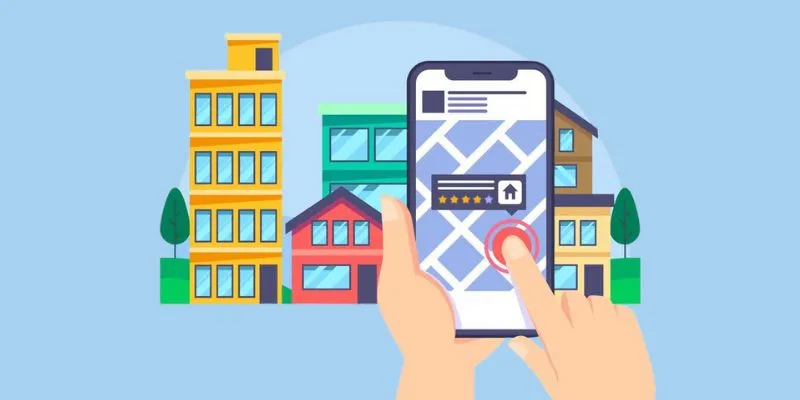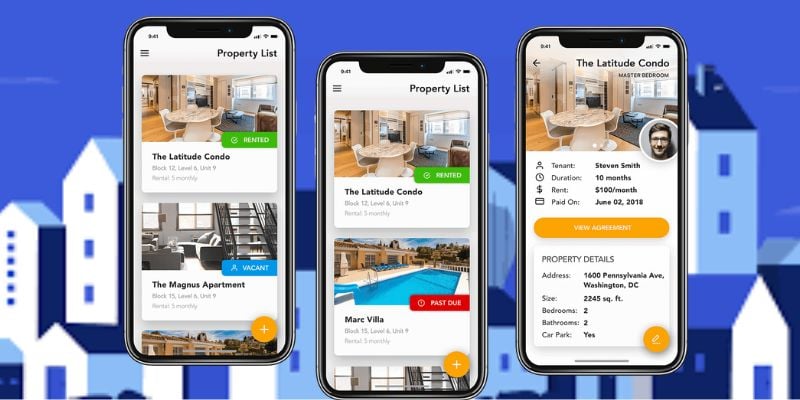Every 1 in 4 individuals uses a real-estate application on their phones to look for and purchase a property. Today, this lucrative sector contributes to a significant share of the market and has completely turned to online space. You can get benefited monetarily if you start your online business. You can be upfront in the market and captivate a huge clientele. You might ponder, why invest in Real Estate App Development Services? A business can experience many positive sides once you operate a business virtually. Abiding by the app trend, many companies have gone online.
A tremendous 95% of real estate firms operate through a website, and users can access listings on them as well. Starting with website development is the baby step here, as this will give your brand the utmost exposure in the competitive world. Also, clients can browse listings accordingly. To steer through the harsh competition, users should leverage digital media.
Why is Real Estate App Development a Famous Trend?
The real estate sector is developing way faster than it can be imagined. There is no room for error with it. It would help if you properly addressed all the required needs of the clients; otherwise, you might be left behind in the race. In that case, a real estate app is no less than a weapon for your contenders.
The prominent reasons why to rely on Real Estate App Development Solutions:
- With an accelerated sales process via personalised software solution for real estate featuring digital signature, transfer, virtual tour, and advanced search for accommodation.
-
Having a round-the-clock communication medium in the app helps in quick discussions and lowers the waiting duration.
-
Clients are more than happy to save and shortlist their favourite properties, get information on the neighbourhood, quickly access a mortgage-based calculator, scroll through 3D properties, and much more.
-
Homebuyers benefit from swift document exchange, filling in of property details, and automatically generated answers through the chatbot.
Types of Real Estate Apps
Realtor Apps
Realtor apps are tailored mobile software created to guide agents in the field in managing the business. These apps offer features like engagement tools, market analysis, scheduling appointments, and property listing. With this, realtors can easily access and upgrade listings anytime and remain parallel with the ongoing trends. A centralised space is capable of managing relevant elements. Realtor applications assist agents in increasing productivity and providing clients with better service.
Property Search Apps
Buyers use these apps to look for their dream property by offering a wide range of filters, like number of bedrooms, location, cost range, and more. An effective property search application should possess functionalities like 3D tours, saved search features, and a view of the map to let the consumers stay organised. These apps are supported by machine learning and AI-based algorithms to suggest nearby properties as per search and demand. Users can get in touch with agents or friends to share listings or informed suggestions. These apps can be specifically used to search student housing, luxury homes, or vacation rentals.
Property Listing Apps
These apps help the managers of the properties and realtors to list out accommodation to put on rent or sale. Property listing apps involve features such as online tours, top-notch images, and in-detail descriptions to retain renters or purchasers. The templates provided by the app permit realtors to design special listings and differentiate themselves from their competitors. Embed chatbots that can resolve potential queries of renters or buyers, assisting them with sales automation.
Mortgage Calculator Apps
Mortgage calculator software helps buyers initiate the calculation of mortgage payments according to the down payment, rate of interest, and price of the home. These apps are helpful in keeping a record of savings by refinancing the mortgage that is already present. It gives them extensive thought on how frequently they should spend money, counting upon debts, income, and different expenses. Apart from this, they can also be mindful of their monthly payments leading to interest or pay off their principal amounts.
Home Improvement Apps
These apps are a guiding pathway for homeowners and renters to develop a strategy for implementing renovation projects for the house, whether it is a minor repair or high-grade refurbishment. They provide a stepwise manual to the users and tutorials for fulfilling such projects. Integrate AR technology to enable the visualisation of furniture and decor items in a house before actually buying them. It assists users in finding reputable and licensed contractors for their home restoration needs.
Real Estate Investment Apps
These apps are intended to aid users in searching for and ploughing in money into real estate accommodation, such as commercial or rental houses. Design a platform that allows investors to pool money together to invest. These apps are backed by advanced data analytics that release insights on investment opportunities and ongoing trends. Users can also easily manage the invested properties via the application, which includes handling requests and gathering rental money.
Also Read : Build a Real Estate App Like Zillow: 2024 Full Guide
Features To Be Integrated in Real Estate App Development Solutions
Features are a crucial aspect of the field of real estate app development. It will only take time for the user to accept your application if it is lacking in abundant features. Catching the user's base's attention towards your app is not a bed of roses. Your niche of work determines it and which features you should embed in the property-hunting software. Hence, before you hire a mobile app development company, all the possible features should be highlighted in the resultant app. If you need to learn about the features you should include, consider these.
User Onboarding
It is a standard feature for any app running in the real estate industry. The login and registration pages are the first pages a user visits when the app loads. It must be assured that this process is simple enough to enhance the comfort of users. It can be done in three steps:
- Social media authorization
- Email verification
- Phone verification
The first page should be sketched out before grading app development. You can choose to execute one or each verification method. This enhances users' convenience when logging into the application.
User Profile Addition
User profiling is highly useful for a real estate app development company in the future. A feature should be there that allows a person to generate a profile on the app. Users can easily privatise their activities, and other users can’t intrude. Thus, having a unique profile for each user is actually imperative. A buyer's and an agent’s profile must vary. This will help a buyer go through listings, put properties on a wishlist, view listings individually, raise inquiries, and more. Similarly, an agent must be allowed to view schedules, listings, lists of purchasers, ad options, etc.
Listing and Database Creation
An essential feature in a real estate app is accommodation listings. This gives detailed insights into accessible property views. Meanwhile, users who wish to rent out listings can do it pain-free. After all, the traffic on your app is driven by the ease of using it. There should be an extensive database because the listings are never-ending. With time, there is a user influx. A flexible and smooth database should be present. In terms of robustness and durability, the database should be great enough to manage the increased load.
Categories and Filters
When bountiful properties are available on the app, users can get frustrated and confused while looking for a suitable property. To assist clients with this, a feature of simple browsing should be available. This can be fostered via the filter and categories option. This feature will allow users to enter particular information related to the property. This process adds up to the complete app experience, allowing more time for hassle-free searches.
Map Integration
Businesses that usually do not incorporate maps and navigation systems in the app can lose clients in the digitization period. Consumers are eager to know about the property’s surroundings and locality before buying. The value of accommodation is also set by the region in which it is located. This feature also displays statistics and figures of a location and its property, including the rate of crimes, schools within reach, infrastructure, Air Quality Index, and more. It is beneficial for both clients and the mobile app development company.
Cost Estimators
Calculating the cost needs is vital. For instance, the price of a property can be assessed by looking at it on the app. A real estate app development company tends to thrive on how rapidly it can be sold off to a property. Thus, this cuts off the timeframe required to decide and allows self-assessment of the cost. The details should be fed into the calculator to enable users to account for initial expenses and loans.
Virtual Tour for Users
Virtual tours give a real-time experience to users of a property visit from the comfort of their home. The users relish the time savings and have high confidence in the purchase choice made easy by the 360-degree view and virtual tour. However, including videos and images is still important. As far as virtual tours are considered, every angle of the property can be observed closely. A 3D walkthrough is the same as a virtual tour and offers buyers an actual sense of how they would like to live in the property they are viewing. The profits gained are driven by the degree of consumer engagement.
App Analytics
Analytics are essential for every mobile application. The app should mandatorily include analytics, which also helps create effective interaction between clients and app managers. Analytics are indicative of the overall app operation. They give insights on likes and dislikes and help users stop their search phase. This, in turn, also leads to better modifications in the app.
Push Notifications
The feature of push notifications will pave the way for the app to be successful in the long run. With this, the users are always kept updated on the market news, price variations, listed homes, and upgrades on the wishlist houses. It is a commendable strategy to build a link between prospective users. To put it another way round, the notifications sent out should be valuable to people who use it. If this capability is put to use less, you are actually in danger of turning people away from your application.
In-App Chats
With the ability to remain in touch with real estate agents, users can always have an accessible means to contact you. This can also lead to increased income by inclining the user towards the choice of buying. The contact can be made in the form of a call-back or texting. Those looking to invest in a property can raise a query in front of the seller or the agent.
Also Read : Real Estate Mobile App Development How to Make an App in 2024
Different Stages of Real Estate App Development
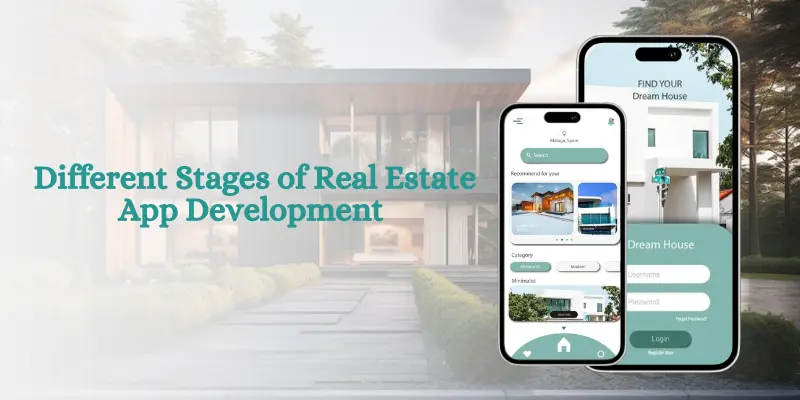
The real estate business is growing continuously; besides, it is profitable and lucrative. One thing that can also be said about it is that in order to make more money in this field, real estate developers need to stay in touch with the newest technologies and strategies. In most cases, it means moving out of your physical office space onto the internet so that you can tap into new-age markets that have yet to be reached before. For you to be able to do this, what you should be thinking of should be a mobile application or website where people would reach out for services that you offer there. Nevertheless, you should be familiar with the above process.
Coming up with a plan
Understanding the core of the project is the first phase of proper app development. You will need to have a conversation with your developer and consider their opinion about the whole project as well. Expert advice from a real estate app development company helps set up an appropriate plan for robust app development.
If you understand the process better, then you can plan some of the best marketing strategies.
The type of app can act as a pivot point where you decide on what features you should include. Lastly, it shows the clients some of the features they are going to experience by the time marketing commences. Consequently, this will make users more interested, causing an increase in purchases. The planning stage is the most basic; any adjustments made after this point may prove expensive.
Designing the Application
The UX and UI designers will refine the approved wireframes so they resemble the app. To achieve that, the user flow and UI elements need to be designed first. It should be noted here that creating a high-fidelity mockup is a must at this stage. Real estate developers can quickly turn this mockup into an actual application. Users are more attracted to consumer-friendly apps. So, keep your app uncomplicated and refrain from unnecessary features.
Development
The real estate app development company you selected will begin writing the app's code at this point. The development phase is the process that takes the longest. This is due to the fact that your engineers will draft multiple models until they find one that meets your requirements. Although strong communication should be made when you hire dedicated developers, this will also assist you in grasping the fundamentals of the app's model, which will be useful to you later on. Once you understand the basic principles of the application, testing and making modifications will be simpler.
App Testing
This is the end stage before an app is launched. Different techniques are available in the market to exercise app testing. You can start with beta testing, where a selected group of customers is present and the app is used by them. With their insightful input, you will be able to test the app more effectively. These are, therefore, the few basic phases that the development of your app will go through. It is important to remember the goals of your app and to be patient.
What Does It Cost to Create a Real Estate Application?
The amount spent on making a real estate app will be influenced by different elements, among them being how complicated an app one wants to come up with. According to statistics, the development of real estate apps is likely to range between $20,000 and $50,000, yet it might even shoot up to $75,000-$100,000 when you incorporate extreme functionalities. Hence, it is necessary to have realistic expectations from the real estate developers. You can work with a variety of development firms to assist you with this process. However, the ideal course of action is to read up on the procedure and weigh the expenses accordingly.
Top 4 Smartphone Apps for Real Estate
Realtor
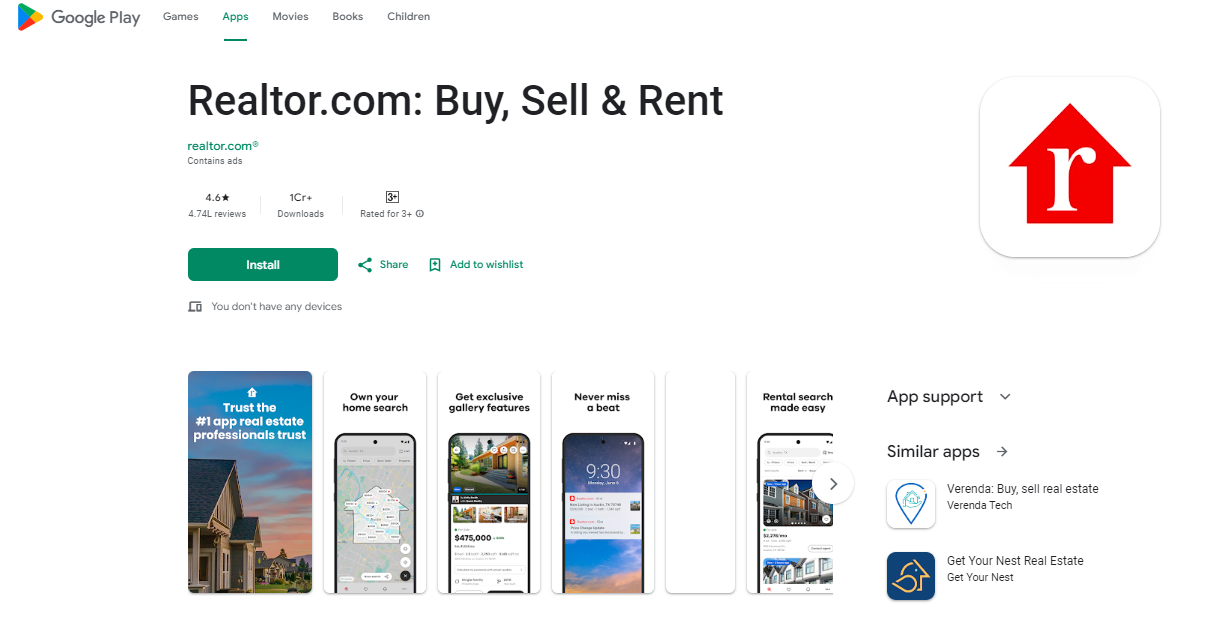
The National Association of Realtors has collaborated with the official website Realtor.com. Landlords might enjoy great benefits by locating tenants and keeping ads running actively. Landlords should use the Realtor app as it offers the most up-to-date information on rental properties. Renters looking for the most recent information will find it to be of great value. Information about nearby schools and noise levels is also provided. It is a commonly used app since it caters to particular needs of the users. The housing application actualizes for rent images and sometimes video tours, allowing landlords to present their property to tenants in waiting without them walking through. Realtor app is supported by ads that make it free for individuals who wish to use it.
LoopNet
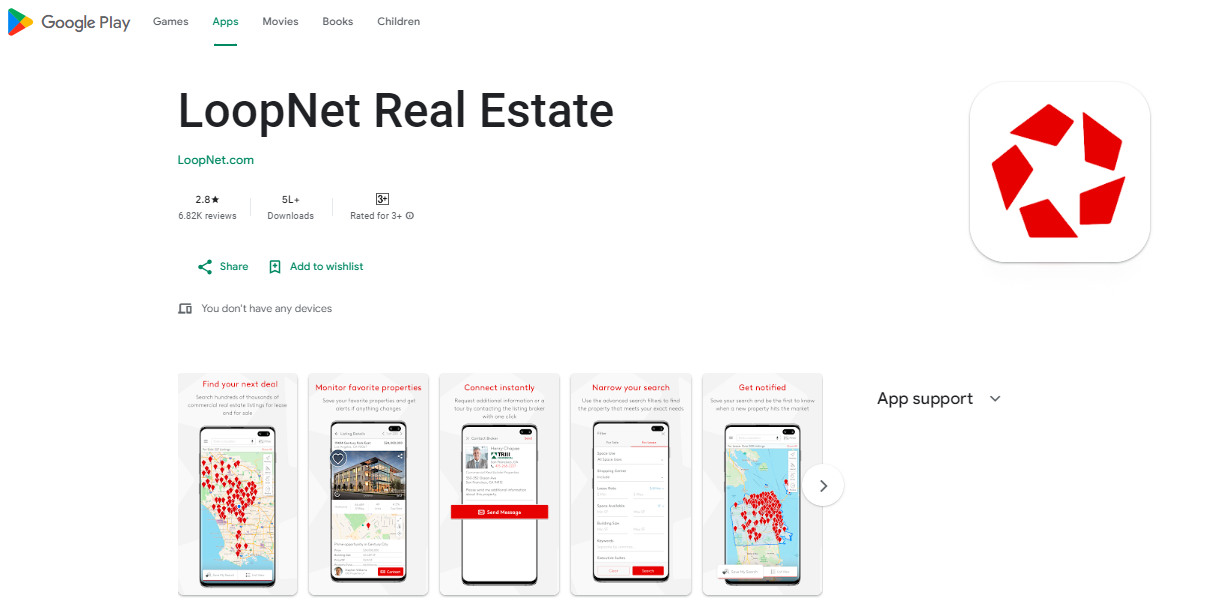
Looking at statistics from Google Trends, commercial searches related to real estate have surged by 60%. Loopnet states that no other app in the whole US lies near the number of consumers and listings or geographic reach. Given the current level of mobile usage, LoopNet's universal impact is becoming increasingly apparent to brokers and organisations operating in the retail real estate industry. The app is expected to recruit professional real estate developers who can smartly handle the inclusion of required elements. Customers can in and out assess the comprehensive pictures, financial information, views of the street, and related factors while employing filters to reduce time of search. LoopNet highlights how important it is to have images and digital content, such photos, virtual tours, and contact details for real estate brokers.
Zillow

Due to its usefulness, it surpasses the competition. Most native Americans visit Zillow each month as compared to any other real estate app development platform. For prospective tenants, it expedites the application process as well. For the most part, this program meets the needs of the user. It also speeds up the application procedure for potential tenants. This software largely satisfies the user's needs. No fees are required to be paid by the sellers or buyers. With useful features like listings, search options, etc., Zillow is the best choice in this sector.
Xome
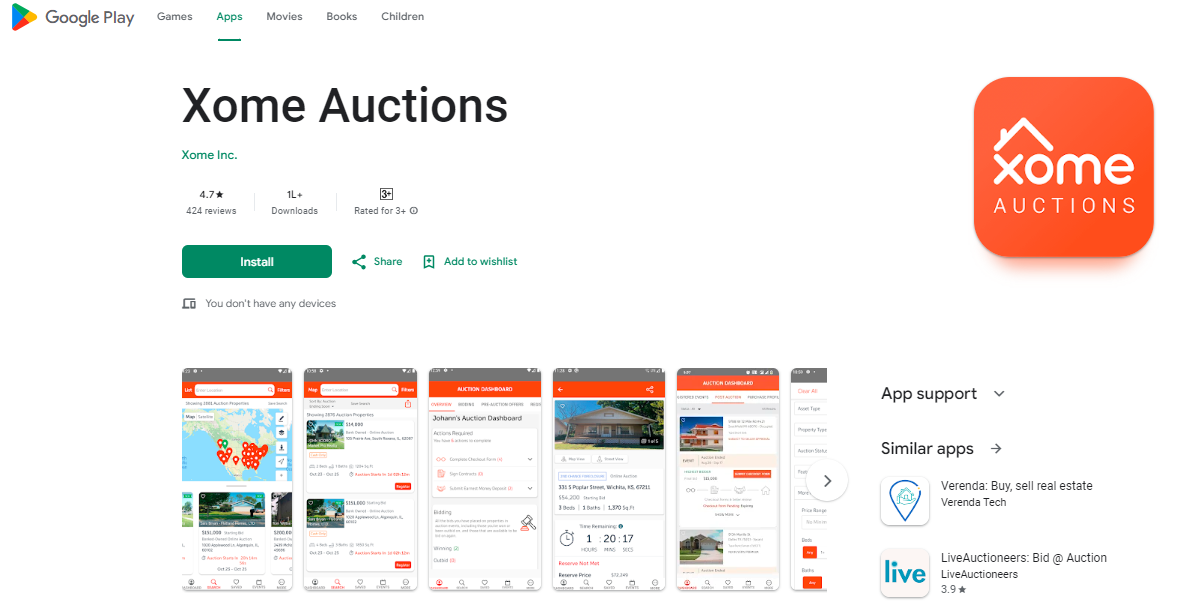
Xome is one of the best real estate websites to seek shelter in your perfect home. It eases the process of merging several apps under one platform. Using its fantastic feature, Xome Zoom, the users can zoom in on different aspects, like the house desired, square footage, bathrooms, bedrooms, cost range, etc. Xome lets you generate a connection bridge with a local agent who can find the property when it is highly desired. As Xome presents customers with a reliable selection and the possible amenities, every mobile app development company should adopt such a strategy and framework to establish fully-functional technical solutions.
Also Read : Top 10 Exclusive App Solutions for Real Estate Companies in 2024
How Can Your Mobile Real Estate App Become Commercial?
Suppose you wish to use your app as a defined money-making source. In this case, you should consider revenue models that are highly suitable for your custom app.
Premium App Subscription
Users might use a free version of the app, but it possesses restricted features. By providing beneficial features in exchange for a fee, users can leverage the app to its full extent. Nevertheless, premium features should be worthy of inspiring people to use a feature-rich application backed by premium aspects.
Monthly Charges
Realtors can pay a monthly fee. As a replacement, they might pay to appear at the top of the search results. Additionally, a trial period might be offered so that users can employ the function free of cost.
Commissions
The most prominent technique of monetization is earning a significant percentage from every deal. However, this shouldn’t be very costly since it can drive a user to your competitor’s app solution.
Collaboration
You may collaborate with one or multiple backing institutions to enable them to offer mortgage loans or relevant aspects. Ultimately, this integration can be an extra means of monetization.
Selling Advertising
A third-party company working in the real estate sector might publish ads in return for an amount. The app allows designers, insurance firms, mortgage lenders, etc., to promote their services effectively.
Conclusion
Real estate app development holds immense potential to modernise the property market. By embedding features such as virtual tours, mortgage calculators, tech stack, and listings of accommodation, cloud services, or AR/VR technologies, coders can develop powerful or consumer-friendly applications. Collaborating with a skilled mobile app development company makes sure that a smooth procedure occurs, starting from ideation to release, delivering an item that fulfils market requirements and offers a competitive edge in the dynamic field of real estate.






